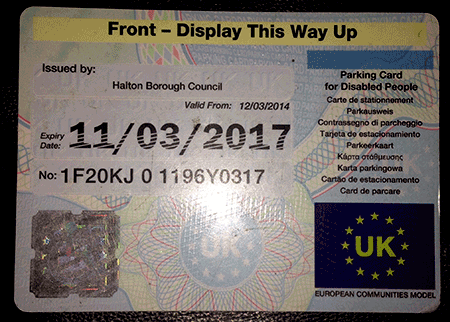Adults with autism are losing their blue badge for parking because new benefit rules focus heavily on physical disability, says a charity.
The National Autistic Society (NAS) say when people move from Disability Living Allowance (DLA) to the Personal Independence Payment (PIP) they can struggle to retain qualification for a blue badge.

Being taken away: the blue badge for disabled parking
The blue badge helps disabled people park closer to their destination.
The UK government now links qualification for a blue badge to PIP, the benefit gradually replacing DLA.
Blue badge ‘essential’ for many
Sarah Lambert is the head of policy at the NAS. She says the blue badge is essential for many people with autism because it makes journeys predictable and reduces meltdowns.
But Lambert said linking the badge to PIP is “problematic for autistic adults” because access “is more narrowly focused on physical ability to get around”.
However, Lambert says the NAS has been lobbying the UK Government over PIP and it is starting to listen.
Proposal for a review
The Government has published a new consultation on transport. It includes a proposal to review the blue badge for people with non-physical disabilities.
The NAS is urging people with autism and their families to respond to the consultation.
Capita and Atos are the two firms the Government pays to carry out PIP tests.
Figures up to September 2016 from the Daily Mirror suggest that 61 per cent of the 90,000 claimants who appealed a PIP decision based on an Atos or Capita assessment won their tribunal.
A spokesperson for Capita said their assessors work in line with Department for Work and Pensions (DWP) guidance.
Atos said it applies assessments equally to everyone.
A DWP spokesperson said people who no longer qualify for a blue badge automatically can still apply to their council under non-automatic criteria.
You can visit the Government’s consultation on access to transport by clicking here.
Related:
Published: 14 September 2017















